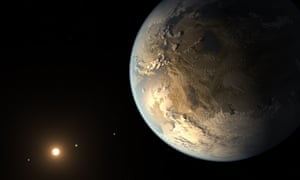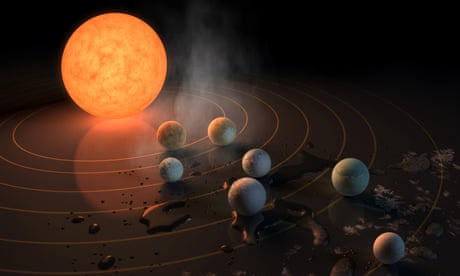What they have found on Mars so far -- organic matter -- does not contradict the Bible in any way.
My hunch is that there are no space aliens, and even if they exist we will not discover them in the near future, as the guy below thinks. If aliens are proven to exist, this will be just one more proof that God is God and that He can create life wherever He wants.
The discovery of alien life may be close. How will religion survive it?
Santhosh Mathew
Encounters with new worlds and new life will present religions with the ultimate theological conundrum. But they will adapt, as they have done before
‘According to Nasa, the latest count of confirmed exoplanets stands at around 3,500 – and at least six of them are potential Earths.’ An artist’s impression of the exoplanet dubbed Kepler-186f. Photograph: T. Pyle/AFP/Getty
About two decades ago, it was quite uncertain whether stars other than our own sun even hosted their own planets. However, according to Nasa, the latest count of confirmed exoplanets stands at around 3,500 – and at least six of them are potential Earths. This count will definitely go up and many researchers believe that the advancement of technology will enable humans to discover some form of life on another planet in the coming years.
Exoplanet discovery: seven Earth-sized planets found orbiting nearby star
Understandably, these discoveries will kindle questions about Earth’s place in the universe. Moreover, contact with intelligent life elsewhere in the universe will present theological and philosophical conundrums that many religions will find deeply challenging. This is especially true for Christianity, which primarily focuses on humankind – and teaches us that God created man in his own image, and all other animals and plants were created for mankind.
The interaction with alien life is not just being discussed in the domain of philosophy any more, it has entered into the traditional scientific realm. Realising this possibility, Nasa, in 2014, gave $1.1m to the Center of Theological Inquiry, an independent institution, to support an initiative to study “the societal implications of astrobiology”. Nasa was criticised by some for providing money to an organisation rooted in Christian theology.
The idea of infinite space with the infinite glory of God originated with Nicholas of Cusa, a German philosopher who kept his infinite theology within the Catholic framework. In 2017, such philosophical thoughts have given way to practical science – three scientists in the field of exoplanet science have been named in Time magazine’s annual list of the 100 most influential people.
The core question would be, does God’s creation extend beyond a single planet? If so, would the inhabitants of those planets believe in the same gods as humans do? How could the creator of the universe deny the inhabitants of those worlds a chance to redeem their sins? Does that mean that God incarnated as Jesus in those worlds contrary to Bible teachings that say that the redemption in Christ was a unique event meant for humans on Earth?


